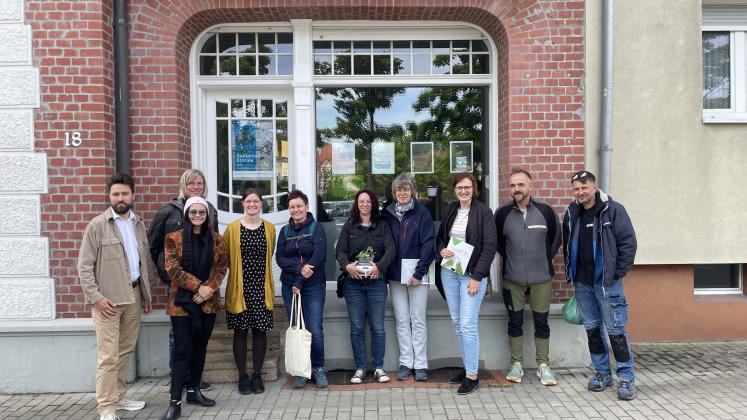A German translation is available marked [DEU].
The kick-off meeting of the ‘VerFarming Weißwasser’ project took place on 22 May 2025 at the UNU-FLORES branch office in Weisswasser. The aim of the meeting was to inform the participants about the topic of vertical farming, present possible applications and embed them in the context of the post-mining landscape of Lusatia.
After the hydroponic plant towers were handed over, the first project workshop began under the direction of Juliane Dziumla, Atiqah Fairuz Salleh and Alexey Alekseenko. In an initial round of introductions, project partners and interested parties talked about their motivation, expectations and prospects for using the planting towers. It became clear that resource-conserving production, regionality and ecological education are key concerns for many of those involved.
Three keynote speeches explored the topics of the project in greater depth: from the challenges of climate change for agriculture to the potential of vertical farming in post-mining landscapes and soil conditions in Lusatia. Both the innovation potential and the problems to be solved with regard to energy consumption and the use of materials in vertical farming were highlighted.
The wishes, concerns and ideas of the participants were collected in an interactive session. The desire for visibility for sustainable cultivation, especially in educational institutions, was just as present as concerns regarding the technical longevity and harvest yield of the plant towers.
The workshop not only provided valuable technical input, but also strengthened the common understanding of the project's goals. Through this collaboration, vertical farming can be made visible and tangible in Lusatia.
For more information about the project, please visit: VerFarming Weisswasser/Weißwasser | United Nations University
_________
[DEU]
VerFarming Weißwasser Projekt Kick-Off
Am 22. Mai 2025 fand in der UNU-Flores Außenstelle in Weißwasser das Auftakttreffen des Projekts „VerFarming Weißwasser“ statt. Ziel des Treffens war es, die Teilnehmenden über das Thema Vertical Farming zu informieren, Einsatzmöglichkeiten vorzustellen und diese in den Kontext der Bergbaufolgelandschaft Lausitz einzubetten.
Nachdem die hydroponischen Pflanztürme übergeben wurden, begann der erste Projektworkshop unter Leitung von Juliane Dziumla, Atiqah Fairuz Salleh und Alexey Alekseenko. In einer ersten Vorstellungsrunde sprachen Projektpartner:innen und Interessierte über ihre Motivation, Erwartungen und Perspektiven zur Nutzung der Pflanztürme. Dabei wurde deutlich, dass ressourcenschonende Produktion, Regionalität und ökologische Bildung zentrale Anliegen vieler Beteiligter sind.
Drei Impulsvorträge vertieften die Themen des Projekts: Von den Herausforderungen des Klimawandels für die Landwirtschaft über die Potenziale von Vertical Farming in Bergbaufolgelandschaften bis hin zur Bodenbeschaffenheit in der Lausitz. Dabei wurde sowohl das Innovationspotenzial als auch die zu lösenden Probleme hinsichtlich des Energieverbrauchs und des Materialeinsatzes im Vertical Farming beleuchtet.
In einem interaktiven Teil wurden die Wünsche, Sorgen und Ideen der Teilnehmer gesammelt. Der Wunsch nach Sichtbarkeit für nachhaltigen Anbau, insbesondere in Bildungseinrichtungen, war ebenso präsent wie Bedenken hinsichtlich der technischen Langlebigkeit und des Ernte-Ertrages der Pflanztürme.
Der Workshop bot nicht nur wertvollen fachlichen Input, sondern stärkte auch das gemeinsame Verständnis für die Ziele des Projekts. Durch diese Zusammenarbeit kann Vertical Farming in der Lausitz sichtbar und erlebbar gemacht werden.
Weitere Informationen zum Projekt finden Sie hier: VerFarming Weisswasser/Weißwasser | United Nations University



